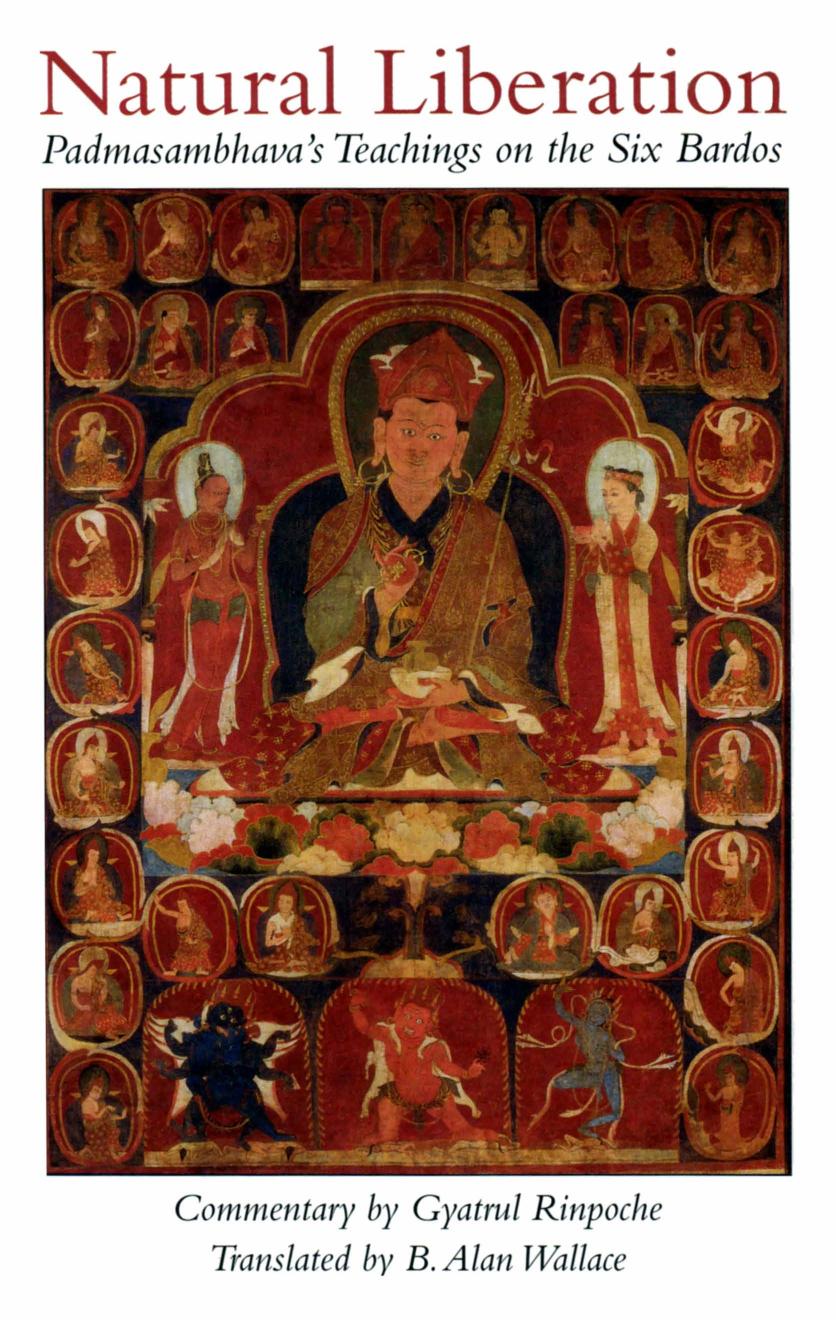Natural Liberation: Padmasambhava's Teachings on the Six Bardos by Padmasambhava

Author:Padmasambhava
Language: eng
Format: azw3, pdf
ISBN: 9780861717248
Publisher: Perseus Books Group
Published: 2012-06-04T03:00:00+00:00
5
The Natural Liberation of Awareness: Experiential Instructions on the Transitional Process of Meditative Stabilization
In the third general topic, the transitional process of meditative stabilization—called the “natural liberation of awareness,” with practical instructions comparable to a lovely young woman gazing into a mirror and seeing clearly what had been unclear—is the subject to be taught. Previously, awareness was pointed out and was shown to be “just this,” resulting in the mind being tenaciously apprehended as clarity and awareness. By grasping onto it as just that, you cannot be liberated. So here are instructions for enhancing meditative stabilization through identifying awareness by way of practice that is without grasping and that transcends the intellect. Maintaining awareness through careful examination is liberating, so these are called “the instructions on the natural liberation of awareness.”
The fundamental obstacle to achieving liberation is grasping. For example, in Hīnayāna practice, there is still grasping onto personal identitylessness, which hinders one’s attainment of spiritual awakening. The type of grasping addressed in these teachings is the subtle grasping onto awareness itself, and the natural liberation of awareness takes place when such grasping ceases. As for the analogy, imagine a lovely young woman who looks into the mirror, puts on her make-up, and makes herself as beautiful as she can. She wants other people to think she’s very lovely. By looking into the mirror she can detect any flaws in her appearance, and then she can correct them. Likewise, these teachings show us how to look into the mirror of awareness and perceive that which had previously been unclear.
Prior to this stage of practice, your spiritual mentor should have pointed out to you the salient characteristics of awareness. But then those very qualities can become objects of grasping, since even if you have identified the nature of awareness, you may still be grasping onto it. Now this phase of the practice is intended to lead you beyond that grasping in a way that transcends the intellect. Among Buddhists, it is not only Hīnayāna practitioners who succumb to grasping. Even in the practice of Vajrayāna, the tendency of grasping may be perpetuated in many ways, as, for example, in the stage of generation.
Once there was a lama in Tibet by the name of Kushok Abu, who some people regarded as an incarnation of Khyentse Yeshe Dorje. He was a great lama with extraordinarily profound realization. This lama commented that if people practice the stage of generation with grasping, imagining themselves as wrathful deities with their mouths gaping wide, fangs bared, and so on, this just leads to rebirth as a king of demons. Likewise, if people meditate on their Dharma protectors with grasping, that could also lead to rebirth as a demon. The problem here is not in the visualization, but in the grasping. The stage of completion can act as an antidote for the grasping that likely occurs on the stage of generation. Conversely, the stage of generation is the antidote for the extreme of nihilism, which may arise on the stage of completion.
Download
Natural Liberation: Padmasambhava's Teachings on the Six Bardos by Padmasambhava.pdf
This site does not store any files on its server. We only index and link to content provided by other sites. Please contact the content providers to delete copyright contents if any and email us, we'll remove relevant links or contents immediately.
The Way of Zen by Alan W. Watts(6603)
Ego Is the Enemy by Ryan Holiday(5417)
The Art of Happiness by The Dalai Lama(4125)
The Book of Joy by Dalai Lama(3976)
Why Buddhism is True by Robert Wright(3447)
Spark Joy by Marie Kondo(3299)
Shift into Freedom by Loch Kelly(3194)
Happiness by Matthieu Ricard(3040)
A Monk's Guide to a Clean House and Mind by Shoukei Matsumoto(2912)
The Lost Art of Good Conversation by Sakyong Mipham(2651)
The Meaning of the Library by unknow(2565)
The Unfettered Mind: Writings from a Zen Master to a Master Swordsman by Takuan Soho(2309)
The Third Eye by T. Lobsang Rampa(2260)
Anthology by T J(2210)
Red Shambhala by Andrei Znamenski(2193)
The Diamond Cutter by Geshe Michael Roach(2058)
Thoughts Without A Thinker: Psychotherapy from a Buddhist Perspective by Epstein Mark(2014)
Twilight of Idols and Anti-Christ by Friedrich Nietzsche(1892)
Advice Not Given by Mark Epstein(1878)
